March 22, 2021
Understanding Your Anxiety: When Worry & Apprehension Are Extreme
Written by Rachel Eddins
Posted in Anxiety and with tags: understand anxiety, worry

Anxiety often seems like it’s uncontrollable.
We all get worried from time to time. Feeling anxious is expected in certain situations.
But, when those apprehensions seem to take over your life and leave you feeling paralyzed, understanding anxiety may be fundamental.
Anxiety often seems like it’s uncontrollable, which can make it feel completely overwhelming. There are many different types of anxiety to consider, making it even more confusing.
But, the symptoms are all somewhat similar. Unfortunately, that doesn’t make them any easier to deal with.
If you’ve been struggling with worry or feeling anxious lately, it’s essential to educate yourself as much as possible about what anxiety looks like.
Are you experiencing anxiety?
Although up to 40 million Americans struggle with severe anxiety each year, plenty of symptoms remain undetected. Mainly, anxiety flies under the radar because it can manifest in “acceptable” ways—strong work ethic, deep desire to help others, cleanliness, etc.
Thus it can be difficult to identify symptoms. Moreover, some anxiety is a normal part of life.
For example, when we tackle an urgent project at work, our nerves tend to rattle. Life-changing events, such as an upcoming wedding or buying a new house, can cause nights filled with worry instead of sleep.
When it comes to the quality of life, though, chronic anxiety is anything but acceptable. And when faced with scary realities such as a global pandemic, anxiety can become exacerbated.
For example:
- Are pushy, distracting, and anxious thoughts invading your mind and finding endless ways to mess with your time, relationships, and purpose?
- Do everyday discomforts feel upsetting or even imminently dangerous?
- Do you feel ready to fight or flee, whenever and however?
You may be living life with a form of anxiety called Generalized Anxiety Disorder (GAD).
If you feel unfocused, less joyful, and perpetually insecure, anxiety interrupts your relationships, passions, and thinking far too often. This disorder keeps you mired in that “on edge” feeling, rarely granting you time without it at all. Nothing brings it on or powers it down. You feel stuck, worried, and ill at ease.
If any of this sounds familiar, it’s time to understand anxiety and how it’s affecting you.
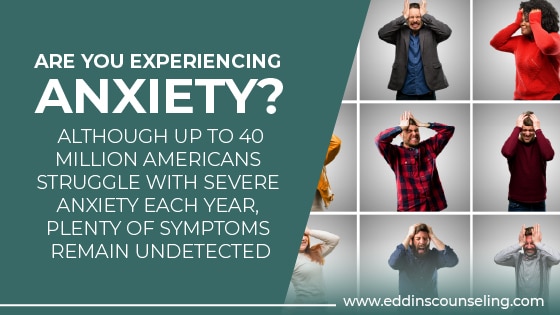
What is generalized anxiety disorder, exactly?
If you think you may be living with GAD but aren’t quite sure, consider the following symptoms that we deem “most common”:
- Excessive worry about your safety and safety of others, social situations, and future events
- Propensity toward catastrophizing
- Oversensitivity to bodily sensations, health matters, and illnesses
- Ongoing nervousness and deep inner disquiet
|
|
Understand Anxiety: What are the causes?
There is no one definite cause of anxiety. Some people have a predisposition to it because of hormonal levels or other chemical imbalances.
For some people, specific “triggers” or situations can cause anxiety. No matter what causes it, though, the most important thing to remember is you’re not alone in feeling anxious.
Over 40 million adults in the United States alone are currently suffering from an anxiety disorder, and that number is merely accounting for the people who report.
Furthermore, no two cases are exactly alike when it comes to the causes.
You may have established fears in childhood that you were able to cope with at the time, and then a traumatic event triggers those worries in adulthood, leaving you in a constant state of nervousness. On the other hand, you may have just become more and more nervous with age.
Anything is possible when it comes to causing anxiety. Just because you haven’t experienced a traumatic event or have a family history does not mean you will live life without understanding anxiety first hand.
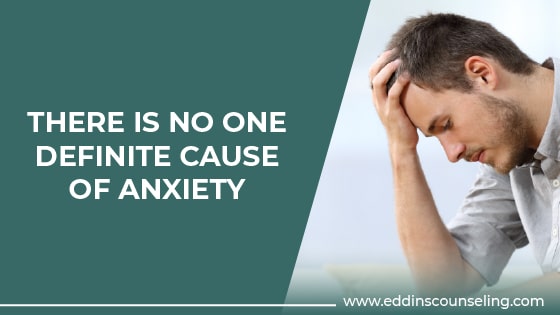
Chronic and Experiential
Living with an anxiety disorder like General Anxiety Disorder seems to be like living in a state of insecurity, doom, or negativity. Things just aren’t okay and can’t or won’t be okay.
Anxious, bothersome thoughts cycle through your brain unchecked and stuck on repeat. And so, chronic anxiety disorders often present as an illness because it behaves like an illness.
It is persistent and inhabits your mind and body. It feels like the anxiety is who you are or a simple fact of your life.
GAD isn’t particularly known for its intensity. Unlike acute anxiety disorders, such as panic disorder, sufferers spend time managing GAD in an expected everyday way rather than anticipating sudden waves of anxiety.
Essentially, it is more mentality than an intense event. It is a more nervous, jumpy experience than an explosive, frightening occurrence.
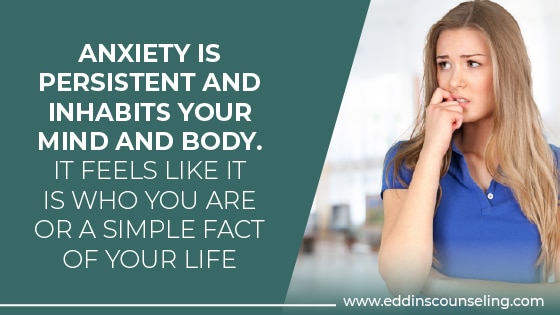
Understand Anxiety: What Are Common Symptoms?
To understand anxiety, you need to be clear on what you are working with. What is it like to have your mind? What is it like when that anxious mind takes hold of your body?
Something that is often forgotten when discussing anxiety is how it affects the body and mind. Here are both the physical and mental symptoms of anxiety.
Mental Symptoms of Anxiety
Remember that your anxiety, as rough as it can be, is yours. What happens in your mind is not often seen by the outside world.
So, don’t be disappointed if all of these mental tendencies don’t line up precisely with the anxiety you deal with.

Severe and Intrusive Thoughts
In terms of anxiety, worry is the main driver. And this particular worry isn’t a passing thought.
Instead, worrisome thoughts are debilitating and interrupt your daily life.
If you’re unsure whether your worry is warranted and normal, take note of how often your thoughts “carry you away” throughout the day.
|
|
Difficulty Concentrating
When dealing with anxiety, concentrating can seem like an impossible feat. Hundreds of thoughts can bombard you, distracting you from your original focus.
Perhaps you intend to look up a brownie recipe online. Then you find yourself hours later deep into news reports searching everything you can about your current worry.
Irritability
Most people who are dealing with anxiety face irritability at the same time, as well—especially during exceptionally worrisome moments. When so many other uncomfortable symptoms plague you, it’s no wonder you feel a little on edge.
If you find yourself lashing out at loved ones quickly, then you may be experiencing an anxiety symptom.
Irrational Fears
When struggling with anxiety, the condition tends to insert heaps of worst-case scenarios in your head. There is a reality to them.
Yet, they get taken to the extreme. Therapists call this catastrophizing.
Taking worries to the extreme is a dreadful position to take. Many people even shy away from specific places or social situations to decrease the fear they feel.
Physical Symptoms of Anxiety
Your mind and body are deeply connected. In short, your body reflects what your mind is experiencing.
While learning to understand anxiety watch out for these physical symptoms as anxiety may very well cause them. They generally result from the flight or fight response, which is activated when anxious.

Sleeping Issues & Fatigue
Millions of people battle racing thoughts and insomnia every night. And anxiety is usually to blame.
If you continually have trouble getting to sleep or staying asleep, it’s time to take a closer look at the possible cause.
Granted, your diet, bedtime routine, and overall lifestyle contribute to your sleep quality. However, when your habits support good sleep but you can’t rest, consider anxiety a problem.
CBT for insomnia is a highly effective program that can treat sleep issues without medication.
Tense Muscles & Sweating
Have you ever done a self-check body scan? It’s easy to do; you flex and relax each muscle group throughout your entire body one at a time.
The purpose of a body scan is to clue you in on any tension in your muscles.
Anxiety causes significant muscle tension, pain, or weakness. Instead of blaming age or a bad day, consider that anxiety may be the root of the problem.
Practicing progressive muscle relaxation, meditation, or other relaxation techniques to get to the root of the body’s problem with anxiety treatment can relieve your muscle pain.
Hypervigilance
Because our autonomous nervous system can’t tell the difference between genuine danger and perceived danger—i.e., a grizzly bear and an obnoxious in-law—our bodies respond to danger no matter what. This hardwired reaction kicks our fight-or-flight response into high gear.
Unfortunately, anxiety can cause you to “get stuck” in that hypervigilant mode. Your heart beats faster, your mind races, and you become severely tense.
Think of a vehicle getting stuck in a specific gear. It doesn’t work right, and one “gear” certainly isn’t an effective way to live.
Hypervigilance can be related to trauma. We have specific trauma therapies that can help you heal, reducing the anxiety symptoms of hypervigilance.
Restlessness
Have you ever sat down to watch a movie only to get up a dozen times before the plot twist plays out?
Restlessness is a feeling in your body, screaming for you to get up and move around. You can’t sit still for long without completing another task or doing “just one more thing.”
Perhaps you try to relax, but you end up playing a game on your tablet while watching Netflix and talking on the phone all at once.
Restlessness often appears as multitasking on steroids. If you can’t sit still, it’s time to figure out if anxiety is the real culprit.
Heart Palpitations, Dizziness, High Blood Pressure, & Shortness of Breath
While these symptoms can stem from other medical issues, they are often symptoms of anxiety, especially anxiety or panic attacks. Experiencing heart palpitations can be very scary.
You might wonder if something really serious is going wrong with your body, which can create fear and panic.
When it’s anxiety-related, it’s more about the imbalance of breathing in more oxygen and breathing out more carbon dioxide, which would be expected if you were running for your life from a tiger.
Since modern anxiety is a product of our mind vs. physical threats (for the most part), this normal biological function creates a physical imbalance. Your body responds as if a tiger is chasing you, but you don’t exert any physical energy in “running away.”
Practicing breathing techniques can help you slow your body’s stress response and bring your body’s anxiety response back down.
Digestive & Gastrointestinal Problems
Common digestive symptoms of anxiety include indigestion, stomach cramps, IBS, etc. You have more anxiety receptors in your gut than in your brain so that you can experience the symptoms of anxiety more predominantly in your gut.
The gut is basically a ball of nerves (second to your brain). Perhaps you’re familiar with the expression, “butterflies in your stomach?, or “Tied in knots?”
Breathing techniques and working with a therapist to help you with anxiety can calm your nerves and, thus, calm your digestive system.
Understanding How Your Anxiety Affects You is Crucial for Overcoming It
Anxiety takes a significant toll on your mind, but it can also wreak havoc on your body. While anxiety symptoms can vary from person to person, the most common one is intense fear or worry.
It’s as though you experience a feeling of impending doom or as if something terrible is about to happen.
Usually, feeling these things once in a while might not seem like a big deal. But for someone with anxiety, these symptoms are often frequent and extremely intense.
As you can imagine, experiencing them repeatedly can make you feel that the disorder completely takes over your life.
Because these symptoms can be so intense, you might not even want to leave your home. One of the major reasons anxiety and depression are so often linked because one paralyzes you, and the other weighs you down.
Unfortunately, symptoms don’t disappear on their own. While they may not be severe all the time, they generally keep coming back.
For this reason, it’s vital to seek out the right kind of treatment for your extreme worries.
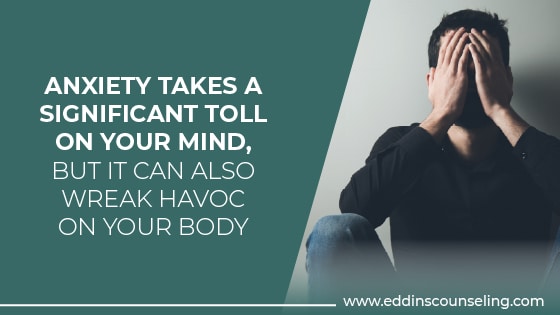
What can you do to overcome General Anxiety Disorder?
Because GAD isn’t particularly triggered anxiety, nothing special needs to happen to inspire chronic fear or worry. The longer it persists untreated, the more established it becomes, deeply influencing your decisions and perceptions.
You may reach a point that you don’t recognize your views as compromised and begin to think your anxious thoughts are accurate.
Thus, to deal with the thought patterns and behaviors altering your life, you’ll need some objective assistance and someone able to impart reliable self-help tools.
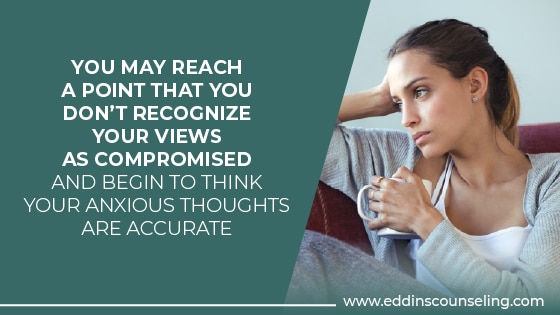
How to Soothe Anxiety in the Moment
As you begin to address your anxiety, you may find that implementing certain activities is soothing, as is refraining from certain unhelpful practices. Consider these ways to relieve these feelings for yourself:
- Mindfulness meditation helps you stay present, aware, and grounded.
- Relaxation techniques like deep breathing from the diaphragm, progressive muscle relaxation to counteract hyperventilation, lightheadedness, and “tingly” or numb extremities.
- Reduce nightly insomnia by changing daytime habits that contribute to racing thoughts or sleeplessness. Consciously implement a restful bedtime routine.
- Limit caffeine intake. Soda, coffee, and some teas can stimulate agitation and restlessness.
- Avoid nicotine and alcohol. These substances seem calming but contribute to higher levels of anxiety.
Therapeutic intervention and self-help techniques are optimal solutions because they help you change your mind and redirect your anxious feelings.
You learn that your internal perception is driving your emotions, not what’s happening externally. Thus, you are more in control than you might currently believe.
How to Treat Anxiety, Understand Anxiety
A good thing to keep in mind is that there isn’t a “quick fix” for treating and understanding anxiety. As much as you may want them to, your symptoms aren’t going to just go away in a day or even two.
With that being said, seeking out treatment for those symptoms and the way you feel is incredibly important. If you want to control your life once again and find some peace, counseling or therapy is often the best solution.
Therapy can help you to manage your suffering and worry. It can also help you to develop a healthier relationship with your thoughts.
It doesn’t matter how long you’ve been struggling; your thoughts aren’t set in stone. Therefore, you don’t have to be stuck thinking and feeling this way forever.
Admitting to yourself that you’re struggling with anxiety is the first step toward getting help.
A therapist can help you to discover some of the possible underlying causes for your anxiety. From there, it’s easier to put together an effective treatment plan.
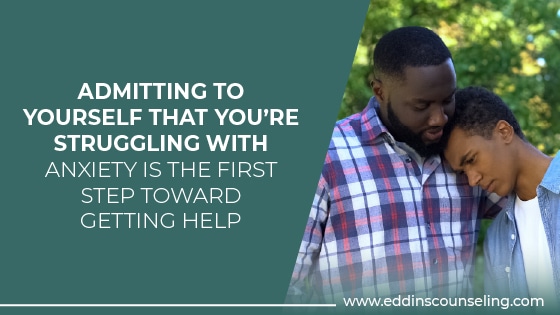
Therapy Makes a Difference, Understand Anxiety
Help from a compassionate therapist experienced in anxiety counseling is one of the most important, if not the most crucial step in your mental health journey.
Anxiety affects your mind and body. To address the mental and physical symptoms, your therapist will likely propose and walk you through compatible coping strategies as part of your treatment.
Cognitive-behavioral therapy is a standard treatment that helps address the looping thoughts that keep you stuck in worry. It also teaches behavioral skills to help reduce symptoms and keep you mindfully focused in the present.
Additionally, as you work with your mental health care professional, you may discover that exploring some past issues, current relationships, or other life challenges that are contributing to your anxiety. Therapy can help you break down what’s bothering you and thoughtfully address whatever is holding you back or bogging you down in fear.
Therapy also provides the safety, time, and place for practicing helpful techniques you can rely on in your everyday life.

Understand Anxiety With the Help of a Specialist
Your life is a series of moments, choices, and thoughts that come together to create your everyday. The state of your mental health can taint every experience with anxious thoughts and symptoms.
By getting professional help, you can identify anxiety symptoms and get better at understanding your anxiety. From there, you can learn to manage your symptoms daily. When you’re able to do that, anxiety becomes less powerful, and you get to be in control once again.
If you’ve been struggling with some of the symptoms listed above, or you find your worries starting to cripple your life, you could have anxiety.
We are not saying that you will be rid of anxiety with a snap of your therapist’s fingers; as lovely as that would be, it’s just not possible.
What professional help offers you is an impartial guide that is not tied to these thoughts and feelings as you may be. With their training and expertise, they will be able to help you step out of the shadow of your anxiety.
A therapist will help you see the difference between your concerns, opinions, and beliefs from those your anxiety distorts. Simply put, they can help you enjoy life again.

Next Steps
If you are struggling to cope with anxiety or simply need help to understand your concern, please contact us. Eddins Counseling Group in Houston, TX, has experienced therapists that specialize in anxiety. Call us today at 832-323-2355 or book an appointment online.
5 Ways to Reduce Anxiety
Get instant access to your free ebook.
Grounding & Self Soothing
Get instant access to your free ebook.
Create Healthier Thoughts & Feelings
Get instant access to your free ebook.
Why You Feel This Way
Get instant access to your free ebook.
















